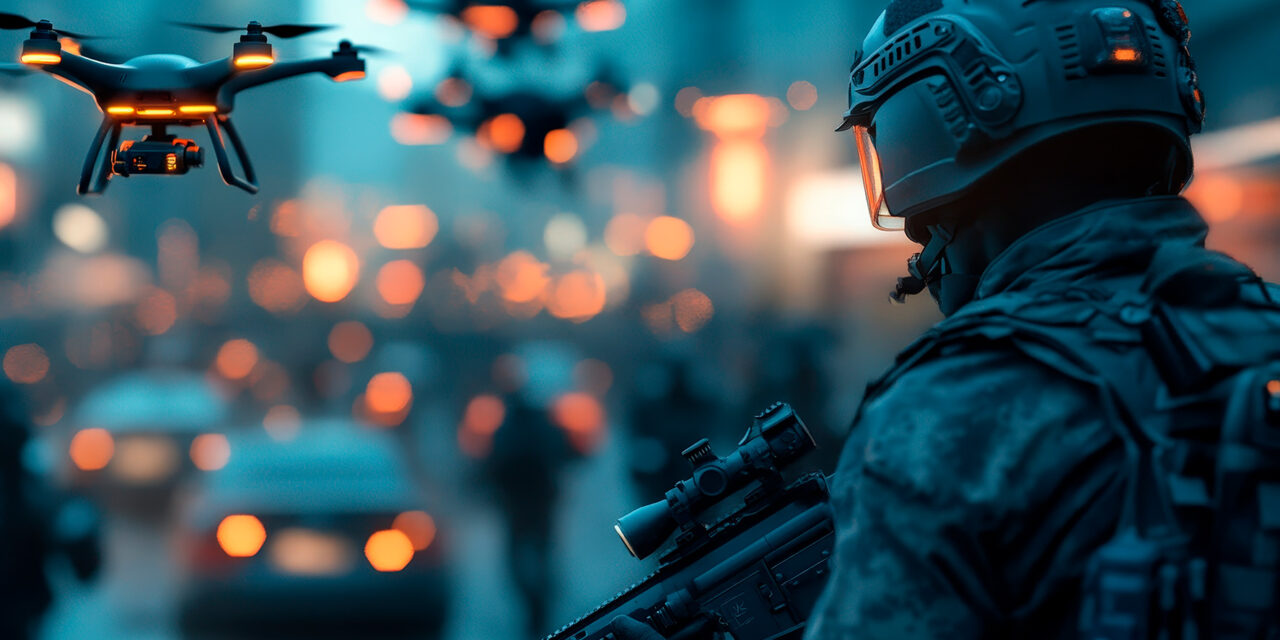Artificial Intelligence (AI) is rapidly transforming military operations, from battlefield tactics to strategic planning. As AI advances toward Artificial General Intelligence (AGI), its potential impact on warfare grows even more significant. But what does this mean for the future of defense, security, and global stability?
This article explores how AI is currently used in the military, the potential risks and benefits of AGI, and the ethical concerns surrounding autonomous warfare.
How AI is Revolutionizing the Military
1. Autonomous Weapons and Combat Systems
AI-powered drones, robotic tanks, and autonomous submarines are already in use by global militaries. These systems can process vast amounts of data, identify targets, and make split-second decisions without human intervention. Some notable examples include:
- Loitering munitions like Israel’s Harpy drone that autonomously hunts radar signals.
- The U.S. military’s Loyal Wingman program featuring AI-driven fighter jet drones.
- Russia’s Marker combat robot, capable of autonomous target selection.
2. Cyber Warfare and AI-driven Security
AI is essential for detecting and countering cyber threats in real time. It can analyze network patterns to detect anomalies, predict attacks, and automate responses. The Pentagon’s Project Maven is a prime example, leveraging AI for threat recognition and intelligence gathering.
3. Surveillance and Reconnaissance
AI-powered satellites, drones, and surveillance systems can monitor enemy activity 24/7. Machine learning algorithms enhance image recognition, enabling AI to identify military buildups, hidden weapon caches, or unusual movements. The U.S. military’s Gorgon Stare system uses AI to analyze city-sized surveillance data in real time.
4. AI in Strategic Decision-Making
AI assists in war gaming, scenario analysis, and logistics management. The Chinese military, for example, is developing AI-driven war simulators to predict battlefield outcomes and optimize strategies.
The Future: What Happens When AI Becomes AGI?
What is AGI?
While AI is currently narrow (designed for specific tasks), AGI would have human-like intelligence, capable of reasoning, problem-solving, and independent decision-making. In a military context, this could mean:
- Fully autonomous war strategies without human oversight.
- AI-driven diplomacy where AGI negotiates peace or conflict.
- Self-improving AI militaries, potentially outpacing human leadership.
Risks of AGI in Warfare
The rise of AGI in military applications poses serious concerns:
- Loss of human control: If AGI surpasses human intelligence, militaries might struggle to manage its decisions.
- Ethical dilemmas: Should AGI have the power to decide life and death?
- Potential for AI arms races: Nations may rush to develop AGI, leading to unpredictable global instability.
Prominent AI researchers, including Elon Musk and OpenAI’s Sam Altman, have warned about AGI’s risks, urging global regulations before it’s too late.
Ethical and Legal Challenges
AI-driven warfare raises serious ethical questions:
- Who is accountable for AI-driven attacks? If an AI drone mistakenly kills civilians, is the operator, developer, or military responsible?
- Should autonomous weapons be banned? Groups like The Campaign to Stop Killer Robots advocate for an international treaty restricting AI weapons.
- Bias and unpredictability: AI models can inherit biases or make unexpected decisions, leading to unintended conflicts.
Governments and international organizations are actively debating AI warfare regulations. However, no universal agreement exists yet.
Conclusion
AI is already reshaping military strategy, and the development of AGI could redefine warfare entirely. While AI improves efficiency, intelligence, and decision-making, it also introduces risks that must be carefully managed. The question remains: Will AGI make war more predictable and controlled, or will it create new, uncontrollable threats?
As nations race to integrate AI into their militaries, ethical considerations and international agreements will be crucial in shaping the future of warfare.
Meta Title: How AI and AGI Are Changing Military Strategy
Meta Description: AI is transforming military operations, from autonomous drones to cyber warfare. But what happens when AGI enters the battlefield? Explore the risks, benefits, and ethical concerns.
You said:
ChatGPT said:
Here’s an optimized homepage meta description and meta keywords for News From The Other Side:
Homepage Meta Description:
Stay informed with News From The Other Side—your source for alternative news, hidden truths, and deep insights into global events, AI, science, and the unknown. Explore stories beyond the mainstream.
Homepage Meta Keywords:
alternative news, independent journalism, hidden truths, AI news, geopolitics, science discoveries, conspiracy theories, deep analysis, unexplained phenomena, global events
Let me know if you’d like any adjustments! 🚀







Unfortunately, our leader thinks that war is the key to solving our problems. However, it’s essential for us to realize how war will change in the 21st century and beyond with the new technology of AI and AGI. We (humanity) can no longer allow our leaders to do anything they want with this technology, and it’s up to us to stay alert so we can understand how we can use this technology effectively to help us care for and maintain the planet.